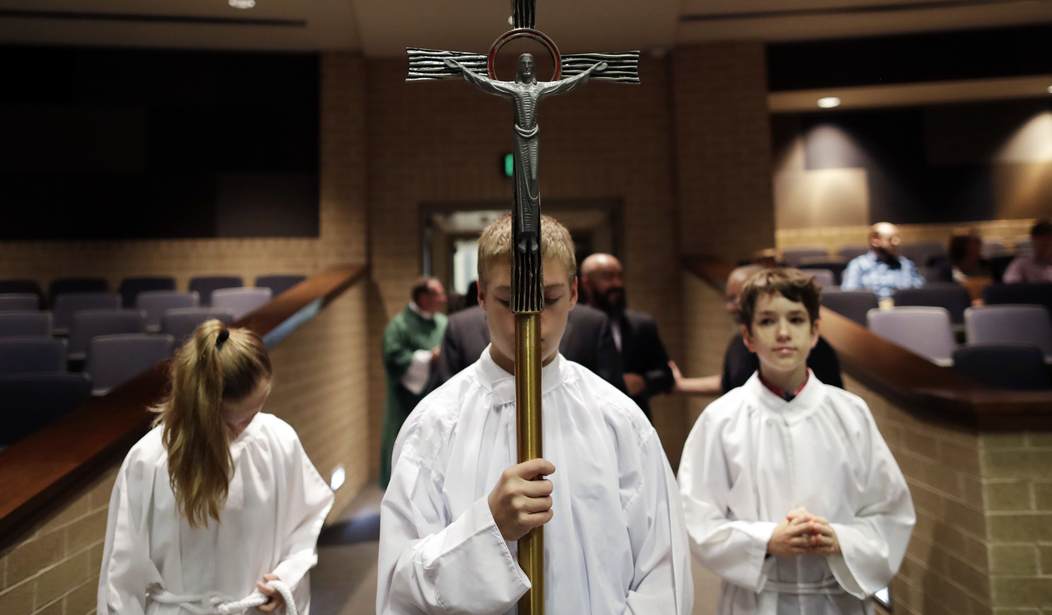Forty years ago, they were 81 percent. As a share of the population, they’ve been cut almost in half. That’s the key takeaway from the always fascinating PRRI religious survey. Eyeball the first pie chart at the link and you’ll see that non-Christian religions are still a tiny share of the overall population. It’s not other faiths that are shrinking the percentage of white Christians, it’s a combination of racial change and growing secularism. A lot of white Christians have drifted into the “unaffiliated” category, which now accounts for nearly a quarter of all Americans. And there are a lot more Latino Christians now than there were 30 years ago. The most mind-boggling stats from this pretty mind-boggling survey have to do with Catholic numbers: Just 11 percent of the U.S. population is white and Catholic now versus seven percent that’s Latino and Catholic. In the early 1990s, 87 percent of American Catholics were white. Today just 55 percent are — and among Catholics under the age of 30, a majority (52 percent) are Latino. We can’t be more than a few decades away from Latinos overtaking whites as a majority of all American Catholics.
How ’bout that unaffiliated group, though, huh? Among the youngest American adults, there are now more unaffiliateds than there are … Protestants. Let that sink in.

Unaffiliateds are the largest “religious” group in 20 states *if* you consider evangelical and mainline Protestants separate religious denominations. Another amazing number: Fewer than 40 percent of white Catholics and white evangelicals are under the age of 50. By comparison, 69 percent of Latino Catholics and 76 percent of Latino Protestants are age 49 or younger. See why Latinos will soon be a majority of U.S. Catholics?
As for Protestants, an interesting point by the man in charge of the poll:
About 17 percent of Americans now identify as white evangelical, compared to 23 percent a decade ago, according to the survey. Membership in the conservative Southern Baptist Convention, the largest U.S. Protestant group, dropped to 15.2 million last year, its lowest number since 1990, according to an analysis by Chuck Kelley, president of the New Orleans Baptist Theological Seminary.
“So often, white evangelicals have been pointing in judgment to white mainline groups, saying when you have liberal theology you decline,” said Robert Jones, chief executive of PRRI. “I think this data really does challenge that interpretation of linking theological conservatism and growth.”
Why aren’t dissatisfied mainliners drifting towards evangelical Protestantism instead of “unaffiliated”? I assume the explanation will be that evangelicals have also gotten too soft and need to return to “real Christianity” to spark a revival.
Here’s the obligatory chart tracking the religious make-up of the two parties over time. In both cases the story is the same — the share of unaffiliateds has nearly tripled, a particularly stark jump among Democrats given the greater number of unaffiliateds within the party to begin with.

There’s not major movement there among non-white faith groups. The big shifts are unaffiliateds eating up the share in each party of white Christians. Be cautious, though, about assuming too much about causation. Most young Americans identify as Democrats, which helps explain why there’s such a large chunk of unaffiliateds among Dems here. Are the young more likely to be unaffiliated because they lean left or are they more likely to lean left because they’re unaffiliated? Or are they more likely to lean left and be unaffiliated simply because they’re young? Whatever the answer, it’s no wonder Democratic senators are starting to grill devoutly religious nominees on their faith at confirmation hearings.
One other point to remember: “Unaffiliated” doesn’t mean “atheist” or even “agnostic.” When PRRI asked unaffiliateds how they identify religiously, just 27 percent said atheist or agnostic. Another 16 percent said they were religious but unconnected to any particular faith. The clear majority, 58 percent, simply said they weren’t religious. Whether that means they’re functionally agnostic or they believe in God but otherwise don’t give much thought to faith is unclear. What is clear is that the unaffiliateds aren’t necessarily anti-religious the way the most outspoken unbelievers in American culture are.
Exit question: Is the GOP coalition now a “coalition of the dying”?








Join the conversation as a VIP Member